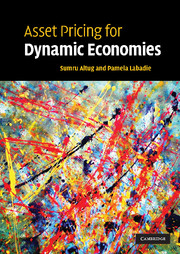Book contents
- Frontmatter
- Contents
- List of figures
- List of tables
- Preface
- I BASIC CONCEPTS
- II RECURSIVE MODELS
- 6 Dynamic programming
- 7 Intertemporal risk sharing
- 8 Consumption and asset pricing
- 9 Non-separable preferences
- 10 Economies with production
- 11 Investment
- 12 Business cycles
- III MONETARY AND INTERNATIONAL MODELS
- IV MODELS WITH MARKET INCOMPLETENESS
- V SUPPLEMENTARY MATERIAL
- Bibliography
- Index
9 - Non-separable preferences
Published online by Cambridge University Press: 01 June 2010
- Frontmatter
- Contents
- List of figures
- List of tables
- Preface
- I BASIC CONCEPTS
- II RECURSIVE MODELS
- 6 Dynamic programming
- 7 Intertemporal risk sharing
- 8 Consumption and asset pricing
- 9 Non-separable preferences
- 10 Economies with production
- 11 Investment
- 12 Business cycles
- III MONETARY AND INTERNATIONAL MODELS
- IV MODELS WITH MARKET INCOMPLETENESS
- V SUPPLEMENTARY MATERIAL
- Bibliography
- Index
Summary
In our framework the stochastic discount factor plays a key role in determining asset-pricing relations. Our analysis up to this point has examined models with preferences that are separable over time and over states. A number of recent studies have proposed alternative preference specifications that allow for non-separabilities. Non-expected utility preferences imply that preferences are non-additive over alternative states of the world. Models with habit persistence and consumption durability allow for non-separabilities over time.
Constantinides [118] and Ferson and Constantinides [183] among others consider models with habit persistence for explaining asset-pricing puzzles. Habit persistence captures the notion that consumers' well-being appears to depend on recent changes in consumption rather than its level. Abel [3] allows for the phenomenon of “keeping up with the Joneses” by modeling habit as being external to the household. Campbell and Cochrane [93] argue that many recent asset puzzles can be explained by allowing for models with an external habit. In a related literature, models with consumption durability have been used by Eichenbaum, Hansen, and Singleton [171], Dunn and Singleton [164], and Eichenbaum and Hansen [169] to model the behavior of consumption and leisure choices, to examine the implications of the term structure of interest rates, and to derive implications for durable goods prices. In this chapter we examine the role of preferences that are non-separable across time and states for explaining a variety of phenomena in the recent macroeconomics literature. These phenomena include asset-pricing puzzles.
- Type
- Chapter
- Information
- Asset Pricing for Dynamic Economies , pp. 202 - 238Publisher: Cambridge University PressPrint publication year: 2008



